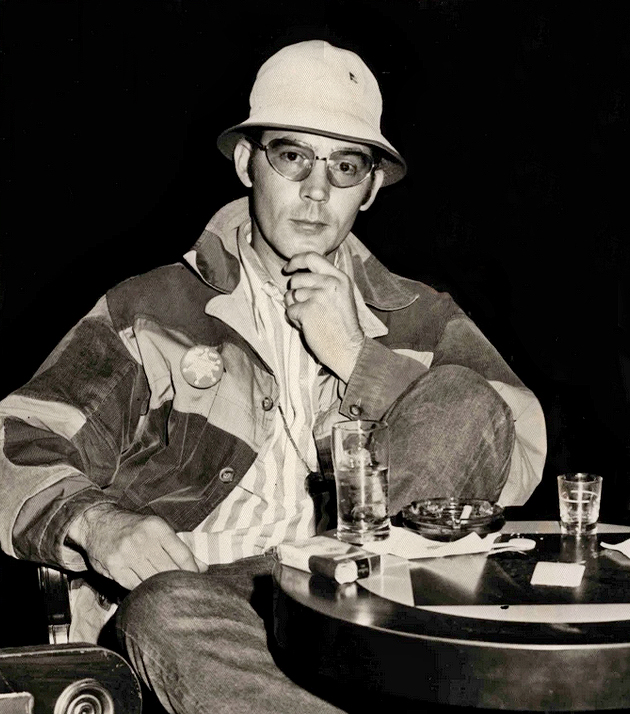When it comes to modern-day drug culture, there is probably no writer better known than Hunter S. Thompson. Although a large number of people are familiar with him solely for his 1971 classic, Fear and Loathing in Las Vegas, he actually rose to prominence with his publication of Hell’s Angels: The Strange and Terrible Saga of the Outlaw Motorcycle Gangs, which employed his unique style of ‘Gonzo Journalism’.
But what exactly does Hunter’s gonzo-style journalism entail, and what does any of this have to do with the cannabis industry? Spoiler alert: everything; starting with a drug-fueled independent journalist and ending with a marketing strategy to sell ‘Hunter’s favorite weed strains’… let’s explore further.
We cover everything important, interesting, and fun, as it pertains to the cannabis industry; so subscribe to the THC Weekly Newsletter to keep up with everything going on right now. It’ll also get you premium access to stellar deals on cannabis products like vapes, edibles, and other paraphernalia! Plus, we’ve also got some sweet offers on cannabinoids, like HHC-O, Delta 8, Delta 9 THC, Delta-10 THC, THCO, THCV, THCP & HHC, which won’t break the bank. Check out our “Best-of” lists to access these deals, and always remember to enjoy responsibly!
What is Gonzo Journalism?
Gonzo journalism refers to a type of “new journalism” that became popularized in the early 1970s and relies heavily on individualistic accounts, first-person experiences, and subjective honesty. While traditional journalistic styles depend on facts and objectivity, gonzo journalism is a full-on, participatory style of writing in which the author is one of the protagonists, offering their readers completely unfiltered points of view (often critiquing politics, regulations, and other social constructs).
The term “gonzo” was first coined in 1970 by Bill Cardoso, editor of The Boston Globe magazine, who used it to describe an article by Thompson titled: The Kentucky Derby is Decadent and Depraved”. Specifically, Cardoso claimed the article, which was written for the June 1970 edition of Scanlan’s Monthly, was “pure Gonzo journalism”. When asked, Cardoso was quoted saying that “gonzo” was “South Boston Irish slang describing the last man standing after an all-night drinking marathon”. Not unfitting for someone like Hunter.
Thompson himself used the word loosely to describe his own work. For example, in Fear and Loathing he wrote: “But what was the story? Nobody had bothered to say. So we would have to drum it up on our own. Free Enterprise. The American Dream. Horatio Alger gone mad on drugs in Las Vegas. Do it now: pure Gonzo journalism.” This book is considered by most to be the ultimate example of actual gonzo journalism, but Thompson saw the work as a “failed experiment”, because be initially intended for it to be published with no edits, but we went in and revised the story five times before print.
Hunter S. Thompson
Aside from being an accomplished author and journalist, Hunter S. Thompson was perhaps even better known for his lifelong use of drugs and alcohol, as well as his outspoken disdain for authority. A common trademark statement of his was: “I hate to advocate drugs, alcohol, violence, or insanity to anyone, but they’ve always worked for me.” Thompson served in the US Air Force from 1955 to 1958, then moved into the field of journalism after leaving the military. After his wildly successful exposé about the Hell’s Angels, Hunter continued submitting articles to numerous different publications including The New York Times Magazine, Esquire, Pageant, Rolling Stone, San Francisco Examiner, and Harper’s; plus several smaller, more independent media outlets.

Thompson believed that objectivity in journalism did not really exist. “I don’t get any satisfaction out of the old traditional journalist’s view: ‘I just covered the story. I just gave it a balanced view,'” Thompson said in an interview with The Atlantic. “Objective journalism is one of the main reasons American politics has been allowed to be so corrupt for so long. You can’t be objective about Nixon,” he added.
Although most of what Thompson wrote was completely true, he packaged his stories in satire, sarcasm, parody, and dark humor to really drive his points home. He based his tell-it-like-it-is style on William Faulkner’s theory that “fiction is often the best fact”. He would investigate all of his stories himself – often in an antagonistic, prankish, and generally unorthodox manner. He was spectacularly careless of deadlines, known to submit his articles “too late to be edited, yet still in time for the printer.” Although a nightmare for his editors, this was intentional, as Hunter prefered that his work be read exactly how he wrote it, in its true “Gonzo” fashion.
Thompson’s contribution to the cannabis movement
As a cannabis industry journalist, I can say that Thompson is 150 percent correct about the dangers of objective journalism. The true role of a journalist is to investigate a subject and expose the truth, no matter who it may offend. These days, even when looking at weed-based media sites, it’s hard to find publications that are truly independent and willing to report the real facts.
If we can’t even rely on the journalists within our own industry to expose government corruption, discuss problematic regulations, break down inaccurate studies and dissolve misinformation… then who can we really trust? In today’s world of rampant ‘fake news’ and all the ‘bought-and-paid-for’ media outlets, the role of the gonzo journalist is more important than ever.
Not only through influence, but Hunter S. Thompson had many direct ties to cannabis legalization efforts of the early 1970s. Thompson was a man who was known to love his pot. “I have always loved marijuana, he said. “It has been a source of joy and comfort to me for many years. And I still think of it as a basic staple of life, along with beer and ice and grapefruits – and millions of Americans agree with me.”
Hunter was long-time supporter of NORML, the National Organization for the Reform Marijuana Laws. He was also a panelist at the organization’s conferences and an ongoing member of their advisory board. NORML was founded in 1970, but plans for such an establishment had been in the works for years prior.
“I had founded NORML 18 months earlier in late 1970, but few people were yet aware of our work,” wrote founder Keith Stroup. He goes on to recount his first encounter with the legendary Hunter S. Thompson.

“When I met Hunter, he was smoking a joint under the bleachers at the opening night of the convention,” Stroup mentioned. “I looked below the bleachers and what I saw was a fairly big guy smoking a fairly fat joint. He was trying to be discreet, but it wasn’t working very well. I could see him hunkering in the shadows – tall and lanky, flailing his arms and oddly familiar. Jesus Christ, I suddenly realized, that’s Hunter S. Thompson!”
Hunter contributed to NORML, and to counter-culture as a whole, for years to come. On the day of his passing, NORML released the following statement: “Hunter was an inspiration to all of us who challenge the status quo in our work and lives. The ultimate outside-the-box visionary, his example reminds each of us to keep asking questions wherever we find ourselves, and whatever we do.”
Gonzo cannabis strains?
Hunter’s widow, Anita Thompson, claims to be in the midst of cloning six of Thompson’s favorite strains from his personal collection. Anita states that she has been storing his flower and hash for the last 15 years, in order to extract DNA from the samples. As ambiguous as these plans may be, it’s a marketing opportunity that has piqued the interest of several dispensaries across the country.
“I am in the process of making the strains available to those who would like to enjoy the authentic Gonzo strains in legal states,” she said in a Facebook post. “I am looking forward to making the authentic strains available in legal states to support Owl Creek Farm and the scholarships.”
Is this really possible though? According to the experts, not exactly. Nishan Karassick, CEO of Phylos Bioscience — a cannabis-focused biotechnology company that specializes in DNA profiling of cannabis strains, said that in theory, the recapturing an old phenotype is technically possible, although not the same as cloning and results may vary, quite dramatically in some cases.
“You can sequence the DNA, and you can see what the nearest relative is, and maybe you can identify something similar to a strain Hunter S. Thompson liked to smoke… but in terms of cloning a dried stash, the technology just isn’t there yet,” he said.
Final thoughts
So, what would Hunter think about media and journalism of today, the current state of industry, his personalized pot strains, and all the other crazy goings-on in the world? It’s hard to tell, but probably, he’d be just as perplexed and on a certain level, excited, as the rest of us to see what the future holds. As he was quoted saying on many occasions, “When the going gets weird, the weird turn pro.” A phrase he truly seemed to live by, and for those working in the cannabis and psychedelics industries, a phrase that hits the mark for us as well.
Welcome all! Thanks for stopping by CBDtesters.co, your #1 web source for comprehensive independent news coverage of the cannabis and psychedelics industries. Join us whenever you can to stay informed on the quickly-moving worlds of cannabis and psychedelics, and check out The THC Weekly Newsletter, to ensure you never miss an important story.
Disclaimer: Hi, I’m a researcher and writer. I’m not a doctor, lawyer, or businessperson. All information in my articles is sourced and referenced, and all opinions stated are mine. I am not giving anyone advice, and though I am more than happy to discuss topics, should someone have a further question or concern, they should seek guidance from a relevant professional.







